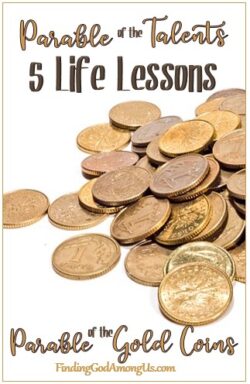The Parable of the Talents might seem confusing at first, but it contains poignant life lessons for every Christian. This parable is also known by various other names, such as The Parable of the Bags of Gold, the Parable of the Coins, and The Parable of the Ten Minas. The Parable of the Talents is included in two Gospels, Luke 19:11-27 and Matthew 25:14-30.
The Parable of the Talents Summary
In The Parable of the Talents (Coins or Minas), a rich man gives his servants coins (or the equivalent in gold, depending on which version of the Bible you’re reading) to manage during the man’s absence. Each servant is given a different amount, according to their ability.
Those who had been given three and five doubled their amount. The rich man was pleased with their faithfulness and promised to entrust them with more. The man who was given one hid his out of fear. The rich man reprimanded him and gave his portion to the one who had gained the most.

What is the lesson of the Parable of the Talents?
The Parable of the Talents (Parable of the Minas or Parable of the Coins) is a wonderful lesson of how we are called to use God’s gifts for His glory. It’s also a firm reminder of God’s expectations of His children and how His expectations vary according to our abilities. God does not dole out blessings, gifts, or even expectations according to the logic of the world! Use the Parable of the Talents Lessons below to strengthen your relationship with God.
5 Life Lessons from the Parable of the Talents for Today
1. God gifted and entrusted us with blessings.
The things we have in life are blessings from God and he has entrusted us with them. He hasn’t given us all the same things. We each have differences in financial status, health, intellect, skills, talents, etc. No matter how much or how little, they are all gifts from God.
2. He expects us to use our gifts wisely.
What will we do with the blessings we’ve been given? God gives us free will to choose. He loves us so much that he allows us to freely decide our path in life. He desires that we grow our gifts for His glory, but it’s up to each of us to decide. Will we help the needy? Clothe the naked? Feed the hungry? Show mercy? Grant forgiveness? Love one another? Or will we squander our money and blessings? Hide or misuse our talents? Use our skills for evil instead of good? Worship money and financial status above God?
3. God doesn’t judge us all by the same standard.
The talents (gold/coins) were given according to each person’s ability. We are created with different skills and abilities and are never entrusted with more than God knows we can handle. He ensures we have the money, resources, aptitude, skills, and ability to accomplish His will for our life, no matter how small or great the goal is. He assesses our performance not based on how our accomplishments compare to others, but upon how well we’ve lived for His good and glory according to our abilities and resources.
4. We will be held accountable.
Judgement Day will eventually arrive. We don’t like to think about our Divine Father as a judge, but I like to liken God’s love to a perfect human father. Even though such a man doesn’t exist, we can imagine that a father who loves his children and wants the best for them has expectations of them. He sets rules and boundaries to keep them safe and on the right path. When they go astray, he corrects them. So it is with God’s judgment. He looks kindly on those who use His gifts and blessings well and prudently. He’s disappointed in those who turn away from Him and choose to bury their gifts or misuse them. Indeed, He says they will be judged harshly.
5. We are called to grow in the Lord.
The Lord gives to us according to our abilities, but as we prove ourselves trustworthy by choosing God’s will, growing in faith, and sharing His glory, He entrusts us with more. This is similar to how a child earns his parent’s trust by doing the right things in small matters until he proves himself worthy of more freedoms and perks, ie, blessings.
As we seek Jesus with all our heart and work for His good, we deepen our relationship, prove our growing abilities, and eventually become entrusted with more blessings to be used for God’s glory. It’s an expanding cycle of God’s amazing will that is ours if we are willing to work for it.
His master replied, ‘Well done, good and faithful servant! You have been faithful with a few things; I will put you in charge of many things. Come and share your master’s happiness!’ Matthew 25:21 NIV

Are you seeking deeper faith, a more meaningful life, or greater inner peace?
Embark on a journey of spiritual growth and self-reflection through the timeless teachings found within the forty parables of Jesus Christ. Grab your ebook, softcover, or LARGE PRINT. Read FREE with Kindle Unlimited! Learn more on Amazon (affiliate link). Read a Sample!
What is the moral lesson of the Parable of the Talents
The moral lesson of the Parable of the Talents is that God expects us to use and grow our gifts (blessings) from God for His glory.
What is the meaning of talent in the Bible?
A talent was an ancient unit of weight that was used to measure precious metals. In the Parable of the Talents, a talent represents gold or coins. You can learn more about the history of talents at LearnReligions.
The Parable of the Talents versus the Parable of the Coins or Parable of the Minas – Differences
Various bible interpretations have evolved over the centuries and many bible versions now exist. Some Bible versions of Matthew 25:14-30 use the term ‘talents’, while others use the terms ‘gold’ or ‘coins’. Still, others use the term ‘minas’.
The context and lesson of the versions are the same. The terms are used interchangeably.
Matthew 25 14-30 meaning in Commentary
You can find a theological commentary of The Parable of the Talents Matthew 25 14-30, meaning from the notable theologian Matthew Henry in his Matthew Henry Concise Commentary. In Chapter 25, refer to the commentary of verses 14-30. I have referred to Matthew Henry’s Concise commentary in preparing this article.
More Parables!
Do you love the parables as much as I do? You may enjoy reading life lessons on these others (listed below), these activities for adults and children, or this list of Parables and Meanings. More parable lessons are underway. See them all HERE!
Do you love journaling? Does writing down your personal reflections help you process your thoughts more fully? Perhaps these Christian writing journals will be helpful as you reflect on the life lessons of the parables.
- 6 Lessons from Mustard Seed Faith
- 4 Parable of the Hidden Treasure Lessons
- 5 Life Lessons from the Parable of the Talents
- 3 Parable of the Lost Sheep Lessons
- The Parable of the Sower explained – which soil are you like?
- 4 Life Lessons from The Parable of the Ten Virgins
- 3 Life Lessons from the Parable of the Rich Fool
- 3 Lessons from the Parable of the Vineyard Workers
- Parable of the Lost Coin Spiritual Lessons
- The Parable of Two Sons – 3 Spiritual Life Lessons
- The Parable of the Weeds – 4 Spiritual Lessons
- The Parable of the Persistent Widow
- Lessons from the Parable of the Pharisee and Tax Collector
- The Parable of the Pearl Life Lessons
- The Parable of the Great Banquet Lessons
- Parable of the Shrewd Manager Life Lessons
- Parable of the Yeast Life Lessons for Today
- Parable of the Unforgiving Servant Life Lessons
- Parable of the Wedding Feast Life Lessons
- Parable of the Net Life Lessons
- The Parable of the Growing Seed
- The Parable of the Tenants Life Lessons
- Parable of the Fig Tree Life Lessons
- Lazarus and the Rich Man Parable Life Lessons
- Parable of the Good Shepherd Bible Lessons
- Parable of the Wineskins Spiritual Lessons
- Parable of the Wise and Foolish Builders Lessons
- Parable of the Faithful Servant Life Lessons
- Parable of the Lamp Life Lessons
- Parable of the Two Debtors Life Lessons
- Parable of the Householder Life Lessons
- Parable of the Friend at Midnight Life Lessons
- Parable of the Master and Servant Life Lessons
- Parable of the Watchful Servants Life Lessons
- Take the Lowest Seat Parable Life Lessons
- The Parable of the Prodigal Son Life Lessons
- 5 Parable of the Good Samaritan Lessons
- The Cost of Being a Disciple Life Lessons
Be the First to Know!
Do you love Christian inspiration and seeking Jesus? What about devotionals and Christian books? Come join my email community!
Image by aleksandra85foto from Pixabay